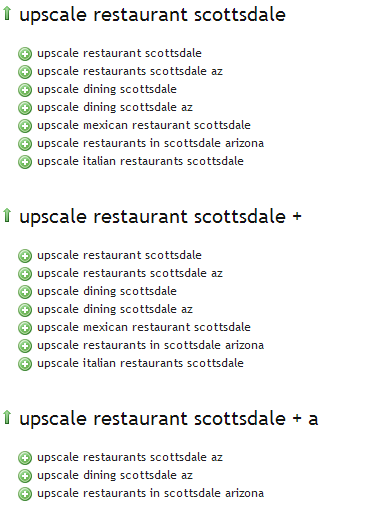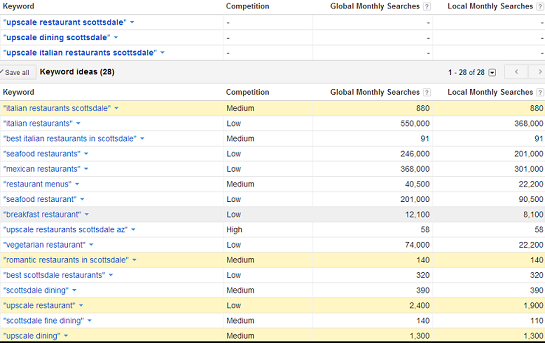I’ve had a fun and exciting (albeit challenging) first week as an SEO strategy intern at RankHammer. Last week I learned all about how to be successful at SEO keyword research; and to tell you the truth, the process was really eye-opening. I discovered that quality SEO keyword research is really the foundation of a good online marketing campaign.
To start with,let’s better define this topic for those of you who are SEO neophytes like myself. SEO keyword research means using relevant words and phrases in your content to help you rank better in search results. Notice the amount of emphasis placed on the word “relevant”. You want to use keywords and phrases that are consistent and compatible with the target market you are trying to attract, as well as the nature of your content. With SEO keyword research, the quality of your viewers far outweighs the quantity.
So now that we know what SEO keyword research is, lets talk about how to apply it to your content. To illustrate these best practices, let’s use Amy’s Baking Company as an example, because they could probably use a little SEO help after their very public social media meltdown. So let’s say that ABC wants to re-brand themselves as an upscale restaurant in Scottsdale. In order to do this effectively, they will need to employ the right tools.
Übersuggest

One of the first tools ABC could use is called Übersuggest. Übersuggest is like a thesaurus for SEO keyword research. As depicted in the image above, Übersuggest shows you what people are searching for based on the words you have typed into the generator. Übersuggest is a great tool because it exposes you to new keywords and combinations of words that you may not have previously considered.
Google Autocomplete
Google Autocomplete is Google’s way of offering search suggestions based on search queries entered by other users. As you type in the search field, Autocomplete shows you related terms in an effort to improve user experience. This is a great tool for SEO keyword research because it does two things: Firstly, it shows you additional keywords that you may not have thought of. Secondly, it helps you get into the mind of the consumer, giving you insight to commonly searched terms.
Google AdWords Keyword Planner
Google AdWords is an incredible and truly essential tool for the SEO copywriter. It’s free version allows you to conduct further keyword research by showing you the monthly search volume for your selected keywords (local search volumes of over 100 are best), as well as similar, popular queries. The competition column shows you how many other sites are using these keyword terms in PPC marketing (terms with medium to low competition are preferable; however, AdWords does not measure for SEO competition. Words with high PPC competition may have low SEO competition and vice versa. Later I will introduce another tool to expose the difference). You can also see whether or not people are searching for these exact phrases or something broader. This tool can help you avoid using SEO keywords that are irrelevant to your content and your target market. In this example, the highlighted phrases would be considered good SEO keywords for Amy’s Baking Company.
(UPDATE 9/13/12: Google has upgraded and the keyword tool has been replaced by the keyword planner. These upgrades make it even easier to plan and track search campaigns through more precise measuring tools, better location targeting, volume filters, personalized adword groupings, and better organization.)
MozBar
MozBar by Moz is a tool developed to measure a site’s SEO strengths. As previously mentioned, this is the tool that helps distinguish SEO competition for a keyword. The free version (available for Firefox and Chrome) shows you a SERP overlay for each search result, telling you whether or not the site has a high page authority and domain authority. A page with high page and domain authorities means a higher ranking search results, as is believed to be an “expert” site. Your goal here is to find a keyword that has a decent search volume, but low competition in regard to these types of authority. As shown above, the keywords “romantic restaurants in Scottsdale” have minimal competition as the search results have low authority. This means that Amy’s Baking Company would likely be able to rank well with these keywords.
Based on our research, Romantic Restaurants in Scottsdale would be a good keyword phrase for Amy’s Baking Company to apply in their copy. Now it is important to mention that SEO keyword research is not going to stop a train wreck. In order to be back in good shape, Amy’s Baking Company needs to completely overhaul their business model. Keyword research is simply a good place to start from an SEO perspective.
—
So now that you have completed your SEO keyword research, there are some important Do’s and Don’ts to remember to effectively implement your keywords:
- DON’T choose keywords that are too broad or that are irrelevant. The use of keywords is to help improve user experience, NOT to try to trick Google into displaying your page all over cyberspace.
- DON’T try to rank for one keyword at a time. This is one of the biggest mistakes made in SEO keyword research. Try to rank for lots of keywords focused around a main idea. For example, if ABC wants to rank for “Best Restaurants”, they should focus on related keywords like “delicious food” and “upscale restaurants” which can help improve their overall rank.
- DO use qualifiers that convey user intent. Include things like price, time, quality, and location in your keyword research.
- DO spend quality time with SEO keyword research. Sometimes you may have to spend a couple of hours tweaking and reorganizing your keywords in the various tools mentioned above; that’s OK. Putting the quality time in now will result in quality leads in the future.
- DO implement your keywords wherever you can: Title tags, meta descriptions, alt text for images, URLs, headings, and of course your copy. The more places you can intelligently incorporate your keywords, the better.
- DON’T sacrifice your readability. Using your keywords too much (i.e. in every sentence) can seem spammy and turn the reader away from your site. Use common sense when writing. Think like the consumer: “Does this sound weird? Is this something I would enjoy reading?”
- DO incorporate the keyword in your social media posts (Facebook, Twitter, Google+). If your social media pages are linked to your site, posts that contain your keywords will help improve your authority ratings.
If you have questions about any of the above mentioned tools or effective keyword research, or ways to improve keyword ranking, leave your thoughts in the comments section below.



